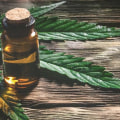There is moderate evidence that CBD may improve sleep disorders, fibromyalgia pain, muscle spasticity related to multiple sclerosis and anxiety. People report that oral CBD helps to relieve anxiety and pain and also helps to sleep better. CBD Announced to Provide Relief for Anxiety, Depression and PTSD. It is also marketed to promote sleep.
Part of the popularity of CBD is that it pretends to be “non-psychoactive” and that consumers can reap health benefits from the plant without the high (or midnight pizza cravings). A prescription cannabidiol (CBD) oil is considered an effective anticonvulsant medication. However, more research is needed to determine other benefits and safety of CBD. In conclusion, yes, CBD really does something, but it all depends on the individual.
Everyone is different, so cannabidiol will affect us all differently. What we do know is that more and more Americans have tried CBD. Every day, there are people who start a daily CBD routine. When you ask yourself if CBD really does something, we know that the answer is a resounding yes.
CBD products can help a person with anxiety. Below we look at some of the best cbd oil products available online. Cooper recently received funding from the National Institutes of Health for a study looking at cannabinoids, including CBD in isolation, as a substitute for opioids, and many other clinical trials of CBD are underway. A range of alternative natural products are available for those who do not want to take CBD oil due to possible risks or personal preferences.
People use CBD oil for many reasons, including pain, depression, and chemotherapy-induced nausea and vomiting. Although CBD oil has many benefits, there are some risks that a person may consider before taking it. Although much of the marketing campaign around CBD focuses on the fact that you can take it without getting high, there isn't much research on the effects of CBD when used in isolation, with a couple of exceptions. Other studies find that CBD is useful in reducing several psychiatric and medical symptoms such as anxiety, insomnia and pain in patients with substance use disorders, indicating that CBD may be an effective treatment for opioid addiction.
Some people find that taking a daily dose can help maintain a level of CBD in the body, which could stimulate the endocannabinoid system (more on what it is, below) to react more to cannabinoids such as CBD. Because so few studies examine the effects of CBD alone, the panel did not publish any findings on CBD specifically, but did reach some conclusions about cannabis and cannabinoids in general. Currently, the only CBD product approved by the Food and Drug Administration is a prescription oil called Epidiolex. A group of researchers analyzed 84 CBD products and found that only 31 percent of them contained the amount of CBD that had been advertised.
This section discusses other natural alternatives for some of the conditions that CBD oil might help with. The usual formulation of CBD is oil, but CBD is also sold as an extract, vaporized liquid and oil-based capsule. It's impossible to tell if the benefits of cannabis can also be obtained from CBD alone, Abrams said, because CBD is just one of the 400 chemicals present in the plant. Animal models and some human studies suggest that CBD may help with anxiety, but those are the only conditions with a lot of research on CBD in isolation.
A recent study of 84 CBD products purchased online showed that more than a quarter of products contained less CBD than labeling. .


